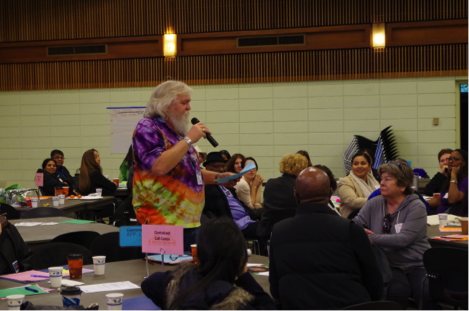Researchers can obtain a broad view of topics by engaging individual Patient and Family Advisors (PFAs) to guide and inform research. This section provides ideas that researchers can use to engage PFAs in short- or long-term partnerships. Keep in mind, experienced PFAs can assist researchers in coordinating and leading these activities and forums.
Surveys. Gathering information from patients and families and PFAs via a survey allows for a wide range of perspectives on an issue, question, or topic and can be used at any stage in a research project. As long as the survey does not share personal health information or other sensitive organizational information, patients and families and online PFAs completing these surveys would not need HIPAA training or a signed Confidentiality agreement to participate. If surveys will be sharing or asking for this type of information, then only PFAs who have completed training and have a signed agreement, could participate. Other training is not necessary for PFAs participating in this way.
Focus Groups. PFAs can participate in research-related focus groups that are specifically designed to tap into their experience as patients and family members and as collaborators with health care professionals in change and improvement. Focus groups can inform any stage of a research project. Because focus groups engage people in discussion rather than in writing, they are especially useful when seeking input from those with language and literacy barriers. Researchers can develop their protocol for focus groups using questions from the Activities and Questions for PFACs in Research Stages or create questions specific to their project.
E-Advisors. E-Advisors are patient, family, and community members who participate via online forums. There are many benefits to an e-advisor program for a research project in that they:
- Enlist a diverse cadre of PFAs that are more representative of the population researchers are studying.
- Allow for quick access to feedback and input about a topic.
- Provide a way for PFAs to participate at times and from locations that are convenient.
- Offer potential for the project to obtain multiple perspectives without a lot of expense.
Some organizations have established e-Advisor programs that researchers may be able to access. If you have to build one for a research project, take into account that diversity is key. Create relationships with health care providers, patient experience and patient relations departments, volunteer departments, relevant patient advocacy groups, and community organizations to recruit a representative group of e-Advisors.
Discussion Boards. Private, invitation only social networking sites can easily be created as a forum for PFA and PFACs to provide input and feedback on research projects and also stay connected between projects. They provide a way for PFAs who have not met in person to share tips and ideas for collaborating in research and news of studies and findings. Discussion boards are most successful when there are regular posts and questions to keep the board active. Written guidelines for participation should be created and agreed upon by discussion board participants. Guidelines should include:
- Purpose of the discussion board
- Membership eligibility
- Participation rules and etiquette, including privacy and confidentiality
- Site monitoring process and management including actions if rules are breached

